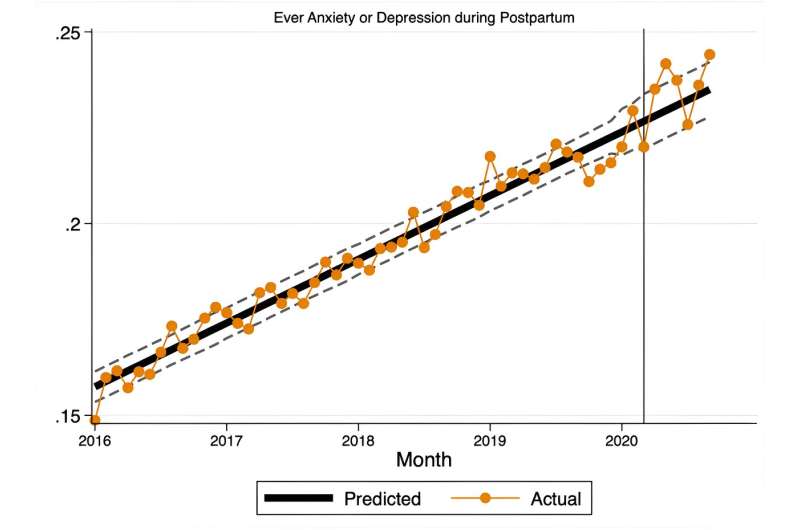This article has been reviewed according to Science X's editorial process and policies. Editors have highlighted the following attributes while ensuring the content's credibility:
fact-checked
trusted source
proofread
Postpartum women filled more benzodiazepine prescriptions during pandemic

New research from the University of Georgia suggests the COVID-19 pandemic may have had an unexpected side effect for postpartum women: more benzodiazepine prescriptions. The findings are published in the journal Archives of Women's Mental Health.
The new study found that the pandemic didn't lead to increases in postpartum depression or anxiety diagnoses. But it did prompt a 15% increase in the number of privately insured new moms filling prescriptions for antianxiety medications like Valium, Xanax, Ativan and Klonopin.
The researchers didn't find an increase in SSRI prescriptions, though.
SSRIs, or selective serotonin reuptake inhibitors, are the gold standard for treating both depression and anxiety disorders. But these drugs, which include medications like Zoloft, Prozac and Lexapro, take time to work.
Benzodiazepines, also known as benzos, are sometimes used as a stopgap during the month or two it takes for an SSRI to start working. But they aren't a substitute for SSRIs. And they carry significant risks of dependence and abuse.
"What concerns me the most is not what we found but what we didn't find," said Grace Bagwell Adams, lead author of the study and an associate professor in UGA's College of Public Health. "You can't tell me there wasn't more depression and anxiety in this population during the pandemic. And historically, even pre-COVID, postpartum depression and anxiety has always been underdiagnosed. But we didn't find an increase in diagnoses."
Postpartum depression, anxiety largely underdiagnosed. The pandemic didn't help.
One in 10 women experience postpartum depression or anxiety in the first six months after giving birth. The majority aren't properly diagnosed and don't receive treatment for the conditions.
The researchers analyzed data from more than 518,000 privately insured postpartum women from January 2016 through December 2020. Despite reported increases in anxiety and depression across the board after the onset of the pandemic, the researchers found no evidence of an increase in diagnoses of postpartum depression or postpartum anxiety.
This suggests that the underdiagnosis and undertreatment of these conditions was exacerbated by the pandemic-induced health care crisis, the researchers said.
Many insurers only cover one postpartum visit, typically at about six weeks after giving birth. Health care providers are supposed to screen for depression and anxiety at these visits.
But during COVID, it's likely that many women didn't have that appointment, Bagwell Adams said. Or if they did, it may have taken place via telehealth, which isn't always ideal for discussing difficult mental health challenges.
"One of the top causes of maternal mortality is suicide," Bagwell Adams said. "When these women don't get diagnosed and they don't receive proper treatment, they die.
"And it's not that postpartum women didn't see their doctor in time. It's that they aren't being listened to."
Benzos aren't a substitute for SSRIs when it comes to depression
After the birth of her son during the pandemic, Bagwell Adams experienced that lack of communication firsthand at her postpartum checkup.
"We had a chat, and I told him I was basically crippled by anxiety and depression," she said. "He was like, 'Let's get you something to help calm you down.' I thought he was going to send me home with an SSRI."
Instead, her doctor prescribed a benzo.
As someone who's dealt with anxiety for years, Bagwell Adams knew that wasn't going to cut it. After some back and forth with her doctor, she was prescribed Lexapro. But many patients wouldn't know to push back like she did.
"The thing I get really worried about it is that this is what we found for the cream of the crop in terms of insurance coverage," Bagwell Adams said. "The women in this sample have private insurance. This is the best-case scenario for the United States, and that doesn't look good."
Combining opioids with benzos likely increased. That combination can be deadly.
Another concerning side effect of increased benzo prescriptions is interactions with other medications, particularly opioids.
More than seven out of every 10 women who give birth via C-section and one in four who deliver vaginally are prescribed opioids for pain management. And previous research shows that opioid prescriptions for postpartum women increased during the COVID-19 pandemic.
But combining opioids with benzos can be deadly. And the likelihood that some of the women who filled benzodiazepine prescriptions were simultaneously taking pain medications is high, the researchers said.
"For me, this study highlights more questions than answers," Bagwell Adams said. "There's something bigger happening here that is really disconcerting when it comes to treating women in general and postpartum women in particular."
More information: Grace Bagwell Adams et al, Increases in benzodiazepine prescribing for postpartum anxiety during COVID-19, Archives of Women's Mental Health (2024). DOI: 10.1007/s00737-024-01488-4


















